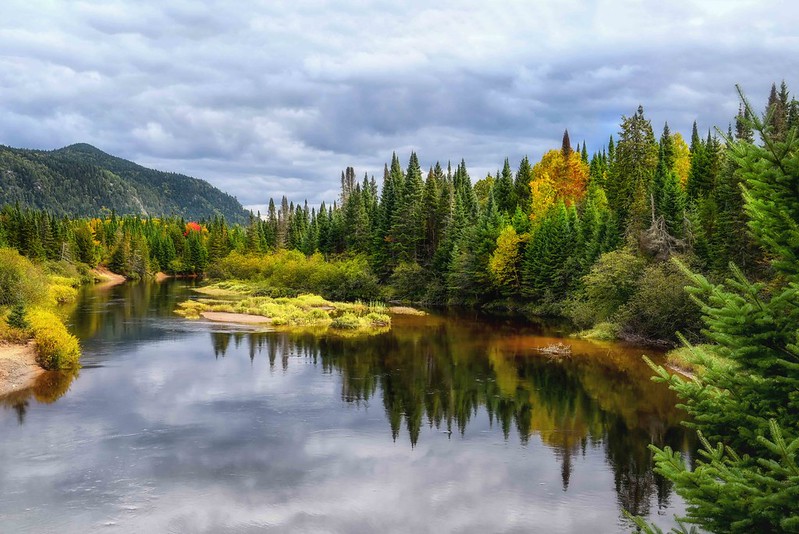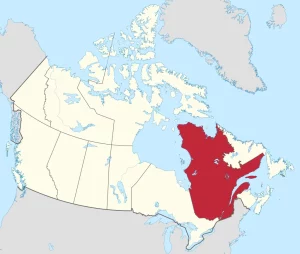Discover Quebec: A Comprehensive Guide to Canada’s French-Speaking Province
Welcome to Quebec, a province that embodies the essence of Canada’s rich history, diverse culture, and stunning natural beauty. From the cobblestone streets of Old Quebec City to the bustling metropolis of Montreal, Quebec offers a unique blend of old-world charm and modern sophistication. So, let’s delve into the captivating world of Quebec!
Where is Quebec located?
In eastern Canada, Quebec is a province of cultural richness and natural beauty. Bordered by the Hudson Bay, Newfoundland and Labrador, and the U.S., it’s a land where French heritage meets modern innovation. From cosmopolitan Montreal to historic Quebec City, it’s a province of diverse experiences.
Quebec is situated in the eastern part of Canada and is the largest province by area. It shares land borders with Ontario to the west, Newfoundland and Labrador to the northeast, and New Brunswick to the southeast. Additionally, it has a coastal border with Nunavut. To the south, it borders the United States. The province’s coordinates are approximately 52°N 72°W. The St. Lawrence River is a significant geographical feature around which much of the province’s population resides, including in its most populous city, Montreal, and the provincial capital, Quebec City.
Geography and Location
Quebec is a sprawling province located in eastern Canada, sharing borders with Ontario, Newfoundland and Labrador, New Brunswick, and the United States. Its vast territory of 1.6 million square kilometers is divided into Northern, Central, and Southern regions, each offering its own set of natural wonders. The St. Lawrence River serves as a lifeline, connecting major cities and emptying into the Gulf of St. Lawrence. With a diverse range of climates and landscapes – from the fjords of the north to the farmlands of the south – Quebec is a paradise for outdoor enthusiasts.

Seasonal Facts/Trends in Quebec
| Season | General Weather Description | Temperature Range (°C) | Temperature Range (°F) |
|---|---|---|---|
| Summer | Warm and humid | 20°C to 30°C | 68°F to 86°F |
| Winter | Cold and snowy | -25°C to -5°C | -13°F to 23°F |
| Spring | Mild and rainy | 5°C to 15°C | 41°F to 59°F |
| Autumn | Cool and colorful | 8°C to 18°C | 46°F to 64°F |
Voyage Through the Seasons: An In-Depth Guide to Quebec’s Weather
Quebec, a province known for its rich history and diverse landscapes, offers various weather conditions, each with its own set of unique activities and experiences. From the warm summers to the snowy winters, here’s what you can expect from the weather in Quebec throughout the year.
Summer: A Season of Festivals and Outdoor Activities
Summer in Quebec is generally warm and humid, with temperatures ranging from 20°C (68°F) to 30°C (86°F). This is the perfect season for outdoor activities like hiking, kayaking, and cycling. The province is also known for its numerous summer festivals, such as the Montreal Jazz Festival, making it a cultural hub during this season.
Winter: A Wonderland of Snow and Ice
Winter in Quebec is a season characterized by cold and snowy conditions, with temperatures ranging from -25°C (-13°F) to -5°C (23°F). The province offers a variety of winter sports like skiing, snowboarding, and ice skating. Quebec’s winter festivals, such as the Quebec Winter Carnival, add a magical touch to the season.
Spring: A Time for Renewal and Exploration
Spring in Quebec is a mild and rainy season, with temperatures ranging from 5°C (41°F) to 15°C (59°F). This is the time when the province’s flora comes to life, making it an excellent period for garden tours and nature walks. The occasional showers only add to the beauty, giving the landscape a fresh, rejuvenated look.
Autumn: A Season of Harvest and Scenic Drives
Autumn in Quebec is a season of cool temperatures and vibrant colors, ranging from 8°C (46°F) to 18°C (64°F). The changing foliage provides a picturesque backdrop for hiking and apple-picking outdoor activities. It’s also a great time to enjoy the province’s harvest festivals and explore its scenic routes.
A Glimpse into History
Quebec’s history is a tapestry woven from the lives of Indigenous peoples and European settlers. Founded in 1608 by Samuel de Champlain, Quebec City became the cornerstone of New France. The province has been a battleground for empires, transitioning from French to British rule in 1763. The Quiet Revolution of the 1960s marked a period of significant social and political change, shaping Quebec’s modern identity.

Culture and Lifestyle
Quebec is a cultural mosaic, blending French heritage with Indigenous traditions and global influences. The province is a hub for arts and creativity, hosting numerous festivals and events throughout the year. Culinary delights like poutine and sugar pie offer a taste of Quebecois culture. The lifestyle here is centered around “joie de vivre,” emphasizing outdoor activities and sports, particularly hockey.

Popular Tourist Destinations
- Old Quebec City: A UNESCO World Heritage site steeped in history.
- Mont-Tremblant National Park: A haven for outdoor enthusiasts.
- Charlevoix: A picturesque region known for its arts scene and natural beauty.
- Saguenay Fjord National Park: A destination for adventure seekers.
- Montmorency Falls: A natural wonder located near Quebec City.

Economy and Industries
Quebec’s economy is a powerhouse driven by diverse industries such as manufacturing, technology, tourism, forestry, and agriculture. The province is a global leader in aerospace manufacturing and is home to numerous tech startups. Tourism is a significant contributor, attracting millions of visitors annually. The forestry and agriculture sectors sustain rural communities, with dairy farming particularly noteworthy.

Did You Know?
- Language Diversity: While French is the official language of Quebec, the province is home to more than 50 Indigenous languages, making it a linguistic melting pot.
- Festival Capital: Quebec hosts over 400 festivals yearly, including the world-famous Quebec Winter Carnival, one of the largest global winter festivals.
- Maple Syrup: Quebec is the world’s largest producer of maple syrup, accounting for about 72% of the global market.
- Historic District: Old Quebec is the only walled city north of Mexico and a UNESCO World Heritage site.
- Poutine Origin: The dish poutine, now popular worldwide, originated in rural Quebec in the late 1950s.
- Literary Heritage: Quebec has produced several internationally acclaimed authors, including Gabrielle Roy and Mordecai Richler.
- Cirque du Soleil: This world-renowned circus troupe was founded in Baie-Saint-Paul, Quebec, in 1984.
- Natural Wonders: Quebec is home to Pingualuit Crater, a meteorite crater about 1.4 million years old and contains some of the purest freshwater in the world.
- Hydroelectric Power: Quebec is one of the world’s largest hydroelectric power producers, harnessing its numerous rivers’ energy.
- Unique Legal System: Quebec is the only province in Canada that follows civil law, whereas the rest of the country follows common law.
Google Maps Quebec
Quebec Cities
Embark on a journey through Quebec, a province known for its rich history, diverse cultures, and stunning natural landscapes. From the vibrant metropolis of Montreal to the scenic beauty of Gaspe, Quebec offers a wide range of experiences for every type of traveler. Here is a list of cities in Quebec, organized by their size:
Montreal, Quebec City, Laval, Gatineau, Longueuil, Sherbrooke, Saguenay, Trois-Rivières, Saint-Jean-sur-Richelieu, Drummondville, Saint-Jérôme, Granby, Terrebonne, Brossard, Repentigny, Shawinigan, Saint-Hyacinthe, Rimouski, Sorel-Tracy, Joliette, Victoriaville, Rouyn-Noranda, Salaberry-de-Valleyfield, Alma, Val-d’Or, Baie-Comeau, Sept-Îles, Thetford Mines, Magog, La Tuque, Matane, and many smaller communities.
Quebec Lakes, Rivers, and Locations
Explore the natural beauty of Quebec, a province renowned for its expansive lakes, flowing rivers, and unique geographical features. Whether you’re captivated by the vastness of Lac Mistassini or intrigued by the historical significance of the St. Lawrence River, Quebec offers a diverse range of natural attractions for outdoor enthusiasts. Below is a list of notable lakes, rivers, and locations in Quebec:
Arnaud River, Bell River, Chaleur Bay, George River, Gulf of St. Lawrence, Harricana River, Hudson Bay, Hudson Strait, Jacques Cartier Passage, James Bay, Koroc River, Lac Albanel, Lac Bienville, Lac Brule, Lac Klotz, Lac Magpie, Lac Manouane, Lac Minto, Lac Mistassini, Lac Nantais, Lac Naococane, Lac Nichicun, Lac Payne, Lac St. Pierre, Lac St.-Jean, Lake Abitibi, Lake Burton, Ottawa River, Peribonca River, Povungnituk River, River aux Feuilles, Reservoir Cabonga, Reservoir Gouin, St. Lawrence River, Ste. Marguerite River, Ungava Bay, Wheeler River.
Conclusion
With its stunning geography, rich history, vibrant culture, and thriving economy, Quebec is truly a remarkable place to visit or live. Whether you are an adventure seeker looking for outdoor activities, a history enthusiast wanting to delve into the past, or simply someone who appreciates diverse cultures and lifestyles, Quebec has something to offer everyone.
One of the main reasons why you should consider visiting or living in Quebec is its breathtaking natural beauty. There are endless outdoor exploration and adventure opportunities from the majestic Laurentian Mountains and picturesque Charlevoix region to the enchanting St. Lawrence River and the captivating Gaspé Peninsula. Hiking through lush forests, skiing down powdery slopes, kayaking along tranquil rivers – these are just some of the incredible experiences that await you in this province.
Moreover, Quebec’s unique blend of French and North American influences creates a cultural tapestry unlike elsewhere in Canada. Montreal alone boasts a vibrant arts scene with numerous museums, galleries, theaters, and festivals showcasing local talent from Francophone and Anglophone communities. And let’s not forget about the mouthwatering cuisine! From poutine to tourtière to maple syrup-infused delights – your taste buds will be treated to an array of delicious flavors.
Another aspect that sets Quebec apart is its fascinating history. As one of the oldest settlements in North America founded by Europeans (dating back over 400 years), Quebec City is steeped in heritage. Strolling through Old Québec feels like stepping back in time with its cobblestone streets lined with centuries-old buildings and fortified walls. Immerse yourself in the stories of explorers such as Samuel de Champlain or learn about pivotal moments like the Battlefields Park, where British forces defeated French troops during the Seven Years’ War.
From an economic standpoint, Quebec also offers excellent opportunities for those looking to work or invest. The province has a diverse and robust economy, with industries ranging from aerospace and technology to agriculture and tourism. With a lower cost of living compared to other major cities in Canada, Quebec offers an attractive option for young professionals and families alike.
In addition, the quality of life in Quebec is highly regarded. The province consistently ranks high in education, healthcare, and overall well-being. Plus, with its strong social support system and progressive policies, Quebec strives to ensure all residents have access to essential services and opportunities.
In conclusion, Quebec has something for everyone – whether you seek adventure, culture, history, career opportunities, or simply a great place to call home. So why not plan your next trip or consider moving to this beautiful province? You won’t be disappointed. Career growth across various industries, including aerospace, information technology, pharmaceuticals, and renewable energy.
